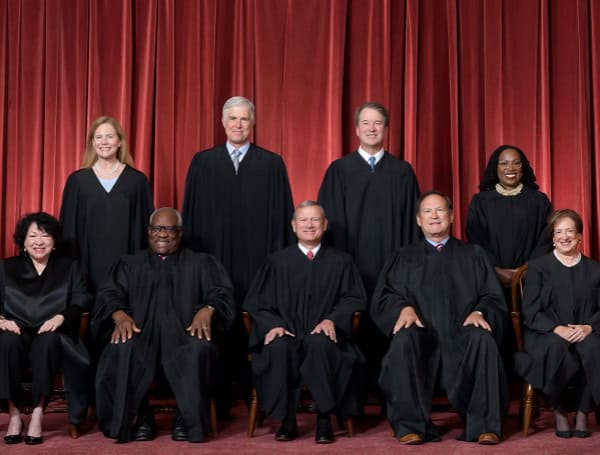A group of Republican senators is renewing their push to criminalize leaks from the U.S. Supreme Court, introducing legislation aimed at imposing strict penalties on those who disclose confidential information related to the Court’s inner workings.
Senators Marsha Blackburn (R-TN), Bill Cassidy, M.D. (R-LA), and Cindy Hyde-Smith (R-MS) have reintroduced the Stop Supreme Court Leakers Act, a bill that would make leaking internal Supreme Court communications a federal crime punishable by up to 10 years in prison and a $10,000 fine.
READ: Trump Is ‘Pis*ed Off’ At Putin, Threatens Harsh Tariffs On Russian Oil
The legislation comes in response to mounting concerns over high-profile leaks in recent years, most notably the 2022 leak of a draft opinion in Dobbs v. Jackson Women’s Health Organization, which overturned Roe v. Wade. That unprecedented breach of confidentiality ignited fierce national debate and calls for greater security and accountability at the high court.
“Individuals who aim to undermine the highest Court in our nation and intimidate its justices should be held accountable for their actions,” said Senator Blackburn. “This legislation ensures the Court’s work remains free from unwanted outside interference.”
The bill would not only criminalize the leaking of sensitive material but would also go a step further by allowing the government to seize profits gained from the leak, such as money made from book deals, paid media appearances, or television contracts.
READ: Maryland Gov Struggles To Explain Why Young Male Voters Are Walking Away From His Party
“Supreme Court leaks should be a criminal offense,” said Senator Cassidy, who authored the profit seizure clause. “Leakers threaten the safety of justices, damage the Court’s reputation, and put lives at risk.”
The proposed law would apply to several categories of sensitive Supreme Court information, including:
- Draft or final opinions not yet released to the public
- Internal notes and communications between justices and staff
- Personal information of justices not otherwise legally accessible
- Any other information deemed confidential by the Chief Justice
“Justices must be able to carry out their responsibilities without the threat of their every action being leaked, whether to influence, embarrass, or threaten them,” said Senator Hyde-Smith. “This legislation is needed to uphold the integrity of the Court.”
Critics of similar efforts in the past have raised First Amendment concerns, arguing that the legislation could chill whistleblower protections and press freedom. However, supporters say the Supreme Court’s unique role in the constitutional system demands extraordinary confidentiality.
READ: Trump Admin To Defend Catholic Charities In SCOTUS Case While Fighting Org In Lower Courts
The bill is likely to receive strong backing among Senate Republicans, though its fate in the Democratic-controlled Senate Judiciary Committee remains uncertain.
Still, the legislation adds to growing calls in Washington to strengthen security and transparency protocols around the nation’s highest court, as political tensions over the judiciary continue to escalate in the wake of contentious rulings.
If passed, it would mark the most significant federal legislation aimed at policing internal leaks from the Supreme Court in modern history.
Please make a small donation to the Tampa Free Press to help sustain independent journalism. Your contribution enables us to continue delivering high-quality, local, and national news coverage.
Connect with us: Follow the Tampa Free Press on Facebook and Twitter for breaking news and updates.
Sign up: Subscribe to our free newsletter for a curated selection of top stories delivered straight to your inbox.
